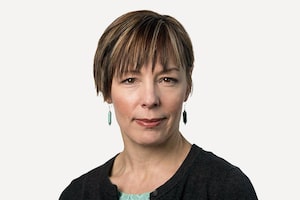'I’m a little bit jittery,' Laurie Throness, seen here in Port Moody, B.C. on March 22, 2012, said in an interview Thursday.John Lehmann/The Globe and Mail
A final count of ballots this weekend will determine whether Laurie Throness, the Liberal candidate forced to resign from his party in the middle of the B.C. election campaign, will have a seat in the legislature.
“I’m a little bit jittery,” Mr. Throness said in an interview Thursday. “We prepared our scrutineers, and we’re all ready to go.”
For most candidates in this fall’s B.C. election, the verdict from voters was clear on Oct. 24, but in at least four ridings where the preliminary count is close, the final count that begins Friday will determine winners and losers.
Mr. Throness, who won the riding of Chilliwack-Kent in 2013 and 2017, was pressed to quit his party – just 10 days before election day – following a string of controversies, including his remarks at an all-candidates meeting where he equated free contraceptives with eugenics.
He remained on the ballot listed as the Liberal candidate and many voters had already voted by mail before he quit – a factor that could give him an edge. On the preliminary count, he was 195 votes behind New Democrat Kelli Paddon, and elections officials in the riding still have more than 7,300 ballots to count.
He would sit as an Independent if he does manage to keep his seat, and although he doesn’t anticipate a warm welcome in Victoria from his former caucus colleagues, he said he would enjoy the freedom of being politically independent.
Across the province, Elections BC has more than 640,000 absentee or mail-in ballots to count – an unprecedented number that may slow the final results.
“We expect the count to take at least three days, but there still is some uncertainty. We have never counted this many mail-in and absentee ballots before,” said Andrew Watson, communications director for Elections BC.
Premier John Horgan’s NDP secured enough support in the preliminary count to be assured of a majority government, but the final shape of the legislature has yet to be determined. The NDP lead in 55 ridings, while the Liberals lead in 29 and the Greens in three.
But four of those ridings were deemed too close to call on election night, and they are all traditionally strong Liberal seats.
The Liberals governed British Columbia for 16 consecutive years until the 2017 election produced a minority NDP government supported by the Greens. Now the Liberals face a reckoning after their worst showing in the popular vote and lowest seat count in seven provincial elections.
The scale of the Liberals' defeat will be clear after the final count. While they can’t hold Chilliwack-Kent, they hope to keep the other three.
The riding of Richmond-South Centre was held by Linda Reid, who represented the Liberals since 1996. Ms. Reid didn’t run again and the Liberals ran a star candidate, Olympic athlete and Richmond councillor Alexa Loo. After the preliminary results, Ms. Loo is trailing NDP candidate Henry Yao by 124 votes. There are more than 5,200 ballots to count.
Another bedrock Liberal riding that could change hands is Vernon-Monashee. Incumbent Eric Foster has held this riding since 2009, and won by a wide margin in 2017. This time he is leading by a razor-thin margin of 183 votes over the NDP’s Harwinder Sandhu, and Elections BC has more than 8,500 ballots left to count.
With more than 7,300 ballots yet to count in Abbotsford-Mission, Liberal incumbent Simon Gibson is leading by 188 votes over New Democrat candidate Pam Alexis. Mr. Gibson held the riding since 2013, and it has been a safe Liberal seat long before that.
Jordan Reid, the NDP’s field director, said her party will have more than 300 scrutineers on deck this weekend, including a number of lawyers, to watch the final count in each riding.
“Certainly our priority is, of course, the tightest races where there are those chances that margins may shift and change,” she said.
The NDP encouraged its supporters to take advantage of the mail-in ballot options, she added. “We’re cautiously optimistic about the results.”
We have a weekly Western Canada newsletter written by our B.C. and Alberta bureau chiefs, providing a comprehensive package of the news you need to know about the region and its place in the issues facing Canada. Sign up today.
 Justine Hunter
Justine Hunter